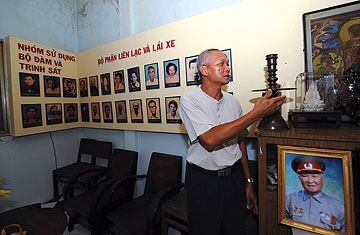
Kitchen confidential The upper floor at Pho Binh commemorates its wartime role
At first glance, pho binh resembles many eateries in Ho Chi Minh City, with its tables lined against bare walls and chef doling out pho bo, the Vietnamese beef-and-noodle soup. But the ironically named restaurant — in English, Pho Binh means "Peace Noodles" — tells an unnerving story of the Vietnam War. On the top floor are photographs of agents of an elite Vietcong cell called F100. For three years in the 1960s, using this shop as a base, dozens of operatives smuggled weaponry from communist North Vietnam to caches around the southern capital. Pho Binh's patriarch, Nguyen Kim Bach, is one of the cell's last living members.
Bach's involvement dates to 1965, when he married the daughter of Ngo Toai, the shop's founder and a man who subsequently became a decorated Vietcong commander. The family would ladle out pho to their enemies — South Vietnamese soldiers and policemen — while cell members hid in the rooms above. They kept the hideout going until 1968, when, acting on intelligence gathered during the North's failed Tet offensive, South Vietnamese police showed up. They arrested Bach and his comrades, shooting two in the head, says Bach, as they marched them to the station. Bach was tortured for two months ("They strapped me to the ceiling and beat my feet with bats") and jailed until a 1973 amnesty led to his release.
Pho Binh not only survived the war, it also managed to stay in operation during the 1970s and 1980s, when socialist Vietnam placed strict curbs on private enterprise. Today the faded eatery, at 7 Ly Chinh Thang Street in District 3, remains popular among the older residents of a now gentrified neighborhood. Visitors can expect a sumptuous serving of beef or chicken pho for $2. To go with it, ask for a local-style iced coffee at just 50 cents — and don't forget to pay a visit to the top floor. Complete with period furnishings and proudly displayed photographs and medals, the onetime hideout is a side order of history that isn't being served in any other noodle shop.
